External links
- Full text at the Internet Archive
| Author | John P. Clark |
|---|---|
| Subject | Philosophy |
| Publisher | Princeton University Press |
Publication date | 1977 |
| Pages | 343 |
| ISBN | 9780691072173 |
The Philosophical Anarchism of William Godwin is a 1977 book by John P. Clark on the philosophy of the moral philosopher and political theorist William Godwin.
Anarchism is a political philosophy and movement that is skeptical of all justifications for authority and seeks to abolish the institutions it claims maintain unnecessary coercion and hierarchy, typically including nation-states, and capitalism. Anarchism advocates for the replacement of the state with stateless societies and voluntary free associations. As a historically left-wing movement, this reading of anarchism is placed on the farthest left of the political spectrum, usually described as the libertarian wing of the socialist movement.
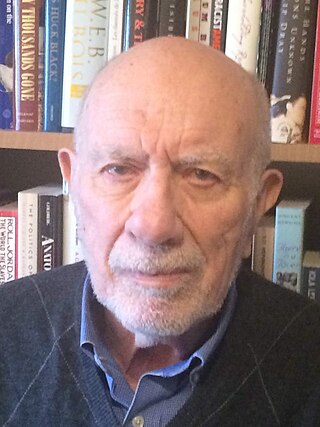
Robert Paul Wolff is an American political philosopher and professor emeritus at the University of Massachusetts Amherst.
Philosophical anarchism is an anarchist school of thought which focuses on intellectual criticism of authority, especially political power, and the legitimacy of governments. The American anarchist and socialist Benjamin Tucker coined the term philosophical anarchism to distinguish peaceful evolutionary anarchism from revolutionary variants. Although philosophical anarchism does not necessarily imply any action or desire for the elimination of authority, philosophical anarchists do not believe that they have an obligation or duty to obey any authority or conversely that the state or any individual has a right to command. Philosophical anarchism is a component especially of individualist anarchism.
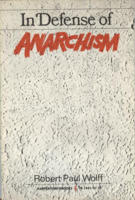
In Defense of Anarchism is a 1970 book by the philosopher Robert Paul Wolff, in which the author defends philosophical anarchism. He argues that individual autonomy and state authority are mutually exclusive and that, as individual autonomy is inalienable, the moral legitimacy of the state collapses.

Anarchism: A History of Libertarian Ideas and Movements is a 1962 book about the history of anarchism by George Woodcock.
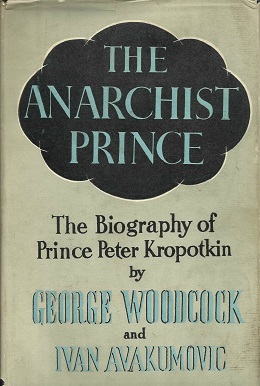
The Anarchist Prince is a biography of Peter Kropotkin by George Woodcock and Ivan Avakumović.

Partisans of Freedom: A Study in American Anarchism is a 1976 history book about the history of anarchism in the United States by William O. Reichert.
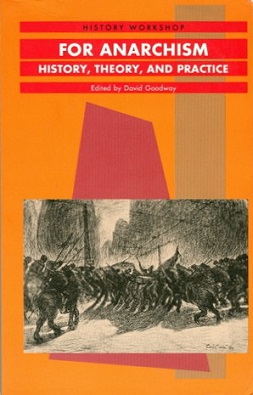
For Anarchism: History, Theory, and Practice is a 1989 book of essays by anarchists on the history, theory, and practice of anarchism. The essays, derived from Leeds Anarchist Research Group meetings in 1985 and 1986, was edited by David Goodway and published by Routledge.
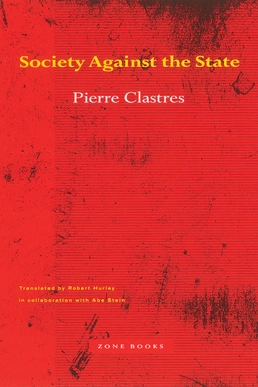
Society Against the State is a 1974 ethnography of power relations in South American rainforest native cultures written by anthropologist Pierre Clastres and best known for its thesis that tribal societies reject the centralization of coercive power. Clastres challenged the idea that all cultures evolve through Westernization to adopt coercive leadership as a popular, ethnocentric myth.
Fields, Factories, and Workshops is an 1899 book by Russian anarchist Peter Kropotkin that discusses the decentralization of industries, possibilities of agriculture, and uses of small industries.
Ethics: Origin and Development is a book by Peter Kropotkin, published posthumously in 1921. It continues the argument of Mutual Aid, that sociable morality is essential to human survival. It was translated into English by Louis S. Friedland and Joseph R. Piroshnikoff in 1924.

The Anarchism of Nestor Makhno, 1918–1921 is a book-length study of Nestor Makhno written by Michael Palij and published by the University of Washington Press in 1976.
Taylor Stoehr (1931–2013) was an American professor and author. He edited several volumes of Paul Goodman's work as his literary executor.
This is a list of works by Murray Bookchin (1921–2006). For a more complete list, please see the Bookchin bibliography compiled by Janet Biehl.
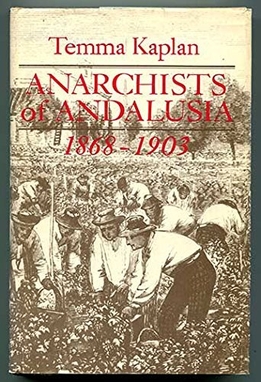
Anarchists of Andalusia, 1868–1903 is a 1977 history book about Spanish anarchists by Temma Kaplan.

William Godwin is a biography of the philosopher William Godwin (1756–1836) written by Peter Marshall and first published in 1984 by Yale University Press.
A History of Socialist Thought is five-book series by G. D. H. Cole published between 1953 and 1960.
William Thomas Blackstone, Jr. was an American academic and philosopher.

John Philip Clark (1945), known professionally as John P. Clark, is an American philosopher, academic, dialectician, author, environmental activist, social theorist, and anarchist. He is Professor Emeritus of Philosophy at Loyola University New Orleans, where he was the Gregory F. Curtin Distinguished Professor in Humane Letters and the Professions. He is currently director of the La Terre Institute for Ecology and Community in Dedeaux, MS. The author and editor of several books and numerous articles, he is also known to write under the pen name Max Cafard.